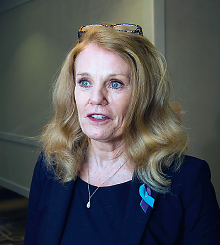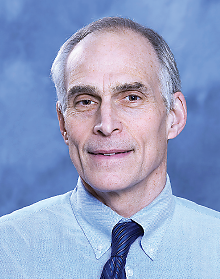Idealism, Pragmatism Attract Psychiatrists to the VA
Abstract
Three psychiatrists who practice in the Veterans Health Administration describe the ups and the downs of working in the nation’s largest medical system.
As salaries and loan repayment levels rise in the Veterans Health Administration (VHA) at the end of this month, the agency hopes to attract more psychiatrists and mental health personnel to its ranks.
What is it like to work for a large federal health agency charged with the care of millions of fellow citizens while also under heavy congressional and public scrutiny?
Three psychiatrists working for the VHA say that their choice to practice psychiatry in the VHA is a multifaceted mix of the pragmatic and idealistic. (All three emphasized that they spoke as individuals and not as a representatives of the VHA.)
Teamwork Was a Lure
Alan Hines, M.D., joined the VHA in 2001 after medical school at Loma Linda University, residency at Walter Reed Army Medical Center, and four years in the U.S. Army as a psychiatrist at Ft. Campbell, Ky. Once out of the Army, he faced a choice of how and where to practice, he said.

Competency and compassion, but not necessarily prior military experience, are the keys to working with veterans in the VHA, says Alan Hines, M.D.
Hines chose the northern Rocky Mountain region to be closer to his parents in Montana and found an opening at the VHA hospital in Boise, Idaho.
After some thought, he also decided that the business, marketing, and insurance aspects of private practice were not for him. “I liked being part of a team in a system of care,” he said, reflecting his military experience. “And I see that in both small and broad terms.”
In the VHA, he could work within a circle that included a full complement of behavioral health staff: nurses, chaplains, attendants, IT experts, legal counsel, and medical colleagues from other specialties. At the same time, he could also draw on the experience and resources of a national organization.
“The flip side is you also have the obligations of a team member, which includes limited autonomy in some circumstances,” he said. For instance, he found the VHA’s treatment planning software hard to get used to initially. “But you have to roll with it and learn to pick your battles.”
Today he works primarily as an administrator, but the frontline psychiatrists in his center have their own clinics and panels of patients. New patients get an hour of face-to-face time, with follow-up sessions of 30 minutes. The rest of the day is filled with collaborative work with colleagues, supervising, writing up notes, team meetings, and training.
His military experience gives him a little extra credibility with his patients, but having a military background is not necessary to be effective with veterans, he said. “We have other psychiatrists on staff without military backgrounds. The key to their success is their competency and compassion.”
Flexibility, Good Benefits Were Key
Jenny Boyer, M.D., Ph.D., J.D., in Tulsa, Okla., had some pretty down-to-earth reasons for moving to the VHA.

Jenny Boyer, M.D., Ph.D., J.D., went to work for the VA initially because it provided good work-life balance. She appreciates the sense of community and opportunity to serve people who had served their country.
“When I had children, I needed a job with defined hours, and I wanted to be in academia,” said Boyer, speaker of the APA Assembly and co-chair of the APA Caucus of VA Psychiatrists. “If you went to the VA, you could get incredibly good benefits, especially retirement, and you could be affiliated with a university and teach students. Once the workday ended, you could go home and take care of your other job, which is your family.”
Once she got into the job, however, she also came to value the sense of community she found in the VHA and the opportunity to serve people who had served their country.
“The price of freedom can be seen at the VA,” she said. “It’s very rewarding, and it’s never boring.”
He Could Witness ‘Tremendous Gains’
Andrew Saxon, M.D., did not have a military background before he completed a psychiatric residency at the University of Washington that included several rotations through the Seattle VA hospital and a stint as chief resident there.

Andrew Saxon, M.D., says that working in the VA gives him freedom to focus on patient care.
Saxon is now the director of the Center of Excellence for Substance Abuse Treatment and Education at the VA Puget Sound Health Center in Seattle and a professor of psychiatry and behavioral science at the University of Washington.
His training complete, Saxon took a full-time job in the addiction treatment program at the Puget Sound facility, intending to stay only a year or two until other opportunities opened up.
“Then everything clicked for me,” he said in an interview. “I enjoyed seeing the tremendous gains in patients who turned their lives around.”
Some patients were more successful than others, of course, but Saxon enjoyed the challenge and has been there ever since. There were other reasons too.
He came to prefer the VA’s team approach to care over solo practice, and he liked the VA’s economic model. “It is not based on fee-for-service,” he said. “I can focus on patient care and not worry about insurance coverage.”
Because the VA is a national system, Saxon also knows he has a large group of colleagues who share his professional interests and stand ready to offer their experience and advice when needed. The well-known electronic health records system is another plus, in his eyes.
He noted, however, that working in a large, national system may not be ideal for someone with a low tolerance for bureaucracy, he said.
“But it is not an unresponsive bureaucracy, even if the response happens slowly,” he said. “There are some limitations of choice and freedom, but the trade-off is worth it.”
Ultimately, the bottom line for Saxon is working with his patients: “Serving veterans who put their lives on the line for our country.” ■



